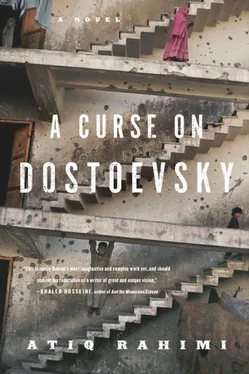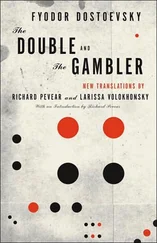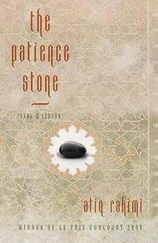Rassoul smoothes down his bloodstained shirt, putting a stop to Yarmohamad’s tirade. The landlord withdraws nervously into his room, still grumbling, “What bullshit! Always the same lies…” Let him grumble, Rassoul. You know the rest: he’ll come back to the window to tell you once more that the only reason he’s put up with you for two years is out of respect for your cousin Razmodin; that if it weren’t for Razmodin, he’d already have thrown you out; that this is it, he no longer gives a shit about you, or about your cousin, etc.
Turn a deaf ear, and go into your room. Don’t look around to see if his wife Rona is there.
She is there, of course, behind another window. Watching Rassoul with a sorry expression on her face, as if trying to find an excuse for him. She loves him. Rassoul is suspicious of her. It’s not that he doesn’t find her attractive. He often thinks of her as he masturbates. It’s just that he doesn’t yet know exactly what she feels for him—passion, or compassion. If it’s compassion then he hates her. And if it’s passion, that will cause even more problems in his relationship with Yarmohamad. So what’s the point of even thinking about it? Better to go to his room. Better to rest, so he can get his breath back, and his voice.
THE DRY creaking of the door disturbs a whole army of flies, who had entered in the hope of finding something to eat. There is nothing here. Just scattered books, a filthy mattress, a few shapeless garments hanging from hooks on the wall, and a clay jug in the corner. That’s all.
Rassoul picks his way in, kicking aside the books lying around his mattress. He collapses on the bed without taking off his shoes. He needs a moment’s respite.
He closes his eyes. Takes slow, gentle, regular breaths.
His tongue is nothing but a piece of old wood.
He stands up.
Drinks.
Lies back down.
His throat is still dry and void, void of sound.
He takes a deep breath, and puffs it out nervously.
Still not the slightest sound.
In a fit of anguish, he sits up and thumps himself on the chest. Nothing. He hits again, harder.
Calm down! There’s no need to worry. It’s just a throat bug, or some kind of chest infection. That’s all. You need to sleep. If it’s still there in the morning, you can go and see a doctor.
He lies down, and turns to face the wall. He curls up—legs bent and hands trapped between his knees—shuts his eyes, and sleeps.
He sleeps until the call to evening prayers, until the gunshots fade on the other side of the mountain. Then there is silence, and it is this disturbing silence that wakes him.
Feverish. No strength to get up. Nor desire, either. Nervous, he tries once more to speak. His breath still comes out strong, but without the slightest sound. More and more distressed, he shuts his eyes again, but the stifled groans of a woman make him jump. He freezes, and holds his jerky breath, listening hard. No more cries, no human noise at all. Intrigued, he labors to his feet, moves toward the window, and glances out past the masses of flies clustered on the pane. In the cold, dull light of the moon the courtyard is sad, empty and still.
After a moment’s pause he lights a candle, pulls a small notepad from among the books, opens it, and scribbles: “Today, I killed Nana Alia.” Then he chucks it back in the corner, among the books.
He drinks some water.
Blows out the candle.
Lies down on his bed.
On the wall above his worn-out body, the moon casts the shadow of the window frame—a cross.
It was a spring day. The Red Army had already left Afghanistan, and the mujahideen hadn’t yet seized power. I had just returned from Leningrad. The reason I’d gone there is a whole other story, one I cannot write down in this notebook. Let’s go back to the day I first met you. That is already almost eighteen months ago. It was at the Kabul University library, where I worked. You came asking for a book and went away with my heart. As soon as I saw you, your modest, evasive gaze took my breath away and your name filled my lungs. Sophia. Everything around me came to a standstill: time, the world… so that you and you alone existed. Without a word I followed you to class, and even waited for you until it finished. But there was no way I could approach you, or speak to you. After that, it was always the same. I did everything I could to watch you passing, for our eyes to meet, to smile at you—and no more than that. Why couldn’t I declare my love? I had no idea. Was it a lack of courage? Pride? Whatever it was, our entire love affair consisted of that fleeting glance and my discreet smile that you may, perhaps, not even have noticed; and if you did, modesty or shyness inhibited your response.
It was this love that brought me to the Dehafghanan neighborhood at the foot of the Asmai mountain, around the corner from you. At the time you lived in a different house, with a beautiful view over the city, right next to those great rocks that I yearned to carve, like Farhad, into your likeness.
Every morning I discreetly accompanied you to university, and then back again in the afternoons. You didn’t take the bus—on purpose, perhaps. You walked slowly, your hair covered with a light scarf, your eyes glued to the ground. Your heart was dancing from the fact of being accompanied, even at a distance, by me, your sweetheart—isn’t that right? Then, one day, you dared create an incident that would allow me to finally approach you. Not terribly original: you dropped your notebook, hoping I would pick it up and return it to you. But your ruse didn’t work! I certainly picked up the notebook, but I never gave it back. I took it with me, gripped tight to my chest like the Koran. And it is in this notebook that I’m writing now.
It was the same notebook he had taken out earlier to scribble: “Today, I killed Nana Alia.”
He had also written poems and tales, all addressed to Sophia, naturally—but which she had never read. For example: “Black is the world. Black is the day. And look at me, Sophia: in this empire of darkness, my heart is leaping. Because tonight, it will be with you!”
You didn’t see me. Perhaps you didn’t even know that I ate at your house tonight. Yes, I was there, with your father; I even saw your brother Dawoud.
It had been almost a year and two months since I last saw you. More precisely, a year and forty-six days. Yes, that’s right. A year and forty-six days ago, I returned to my family in Mazar-e-Sharif. But it no longer felt like home. My father had been so keen for me to study in the USSR, land of his dreams, that he was disappointed when I returned. He couldn’t stand the sight of me. After seven months I left them. And when I returned to Kabul, another war had started, fratricidal this time, in which people were fighting not in the name of freedom but to avenge themselves. The entire city had gone to ground. It had forgotten life, friendship, love… Yes, that was the city I came back to, looking for you. But you no longer lived in the same house. You had moved, but where to? Nobody knew.
Then today, this afternoon, I went to the chai-khana . It was thick with tobacco smoke, and full to bursting with bearded men. I sat in a corner and drank my tea. My attention was drawn to a man’s footsteps as he struggled to make it up the wooden staircase. It was your father, Moharamullah, only now he was missing one leg, and had crutches tucked under his arm. I could hardly believe it. My delight soon dissolved. He was followed by two friends, one with no crutches but limping a great deal and in pain, the other missing an eye and his right arm. All three of them were high, from smoking hash in the basement saqi-khana . They came over to my corner. I immediately shuffled up to make room for them. Your father sat down next to me. He looked at me sharply, making me smile in spite of myself. The smile annoyed him. In his husky, drawling voice he demanded: “Is it your victory that’s making you smile?” and thrust the stump of his amputated leg toward me. “Well, CONGRATULATIONS on that victory, bradar !” I swallowed my smile, leaning forward to tell him that I was neither dabarish , bearded, nor tavarish , military… not conquered, still less conquering. Smoothing my beard, I reassured him that it was simply a “gift” of the war. He seemed impressed by this clever response. His gaze softened as he asked me gently where I was from. From here, from Dehafghanan. “This is the first time I’ve seen you,” he said, looking at me carefully.
Читать дальше












